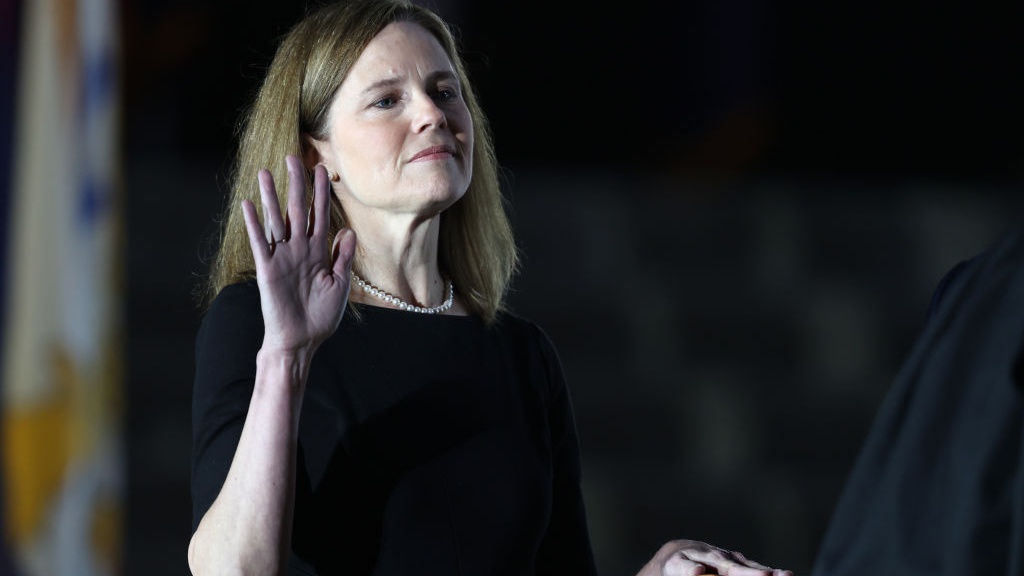For weeks, there has been widespread outcry over the decision by Republican lawmakers to push Amy Coney Barrett onto the Supreme Court just one week before a pivotal election.
On top of the fact that Republicans are breaking their own rules to appoint Barrett and that the ceremony to announce her nomination led to dozens of coronavirus infections, many have complained about her lack of experience.
Barrett is one of the least experienced people to ever be appointed a Supreme Court justice, according to Mother Jones and other news outlets, which found that she has never even tried a case in the U.S. Supreme Court.
Congratulations to Amy Coney Barrett for being less qualified for the Supreme Court than I am for higher education pic.twitter.com/lumadRECAf
— Cam (@cameron_kasky) October 27, 2020
Thousands of people on Twitter shared a graphic from an MSNBC broadcast showing Barrett's lack of qualifications. Mother Jones reported the 48-year-old is the least experienced person to be appointed to the court since Justice Clarence Thomas, who swore her in on Monday night.
Her confirmation hearings were extraordinarily short because she has almost no record for Senators to go over. She produced just 1,800 documents from her past for the Senate Judiciary Committee to look through, a paltry amount compared to both Republican and Democrat appointees to the court in the past.
According to USA Today, Justice Brett Kavanaugh gave the committee 1 million records during his confirmation hearings, while Chief Justice John Roberts handed over 75,000 pages and Justice Elena Kagan turned in 170,000 pages.
Barrett's weak resume and lack of experience have long been a complaint of Democrats who were around when she was nominated by President Donald Trump to be a 7th Circuit Court of Appeals judge in 2017.
The resume she shared with the Senate Judiciary Committee was appalling to many Democratic Senators. In 2017, Illinois Senator Dick Durbin asked her to describe "the ten most significant litigated matters you personally handled," adding that it was rare for nominees to not be able to discuss at least 10.
"I recall only three significant litigated matters that I personally handled," Barrett wrote in response.
In both the 2017 questionnaire and the one she produced last month, Barrett admitted that she has almost no actual court experience. She only spent two years working for a private practice before becoming a law professor at Notre Dame.
She has never tried any case in court, never argued an appeal and never argued a case in the Supreme Court, according to the questionnaire she sent Senators.
None of this is normal, even for Republican nominees to the court. Even controversial appointees like Kavanaugh and Neil Gorsuch spent more than a decade as judges on some level and had worked within the government or as prosecutors.
Justice Sonia Sotomayor had held dozens of high-profile positions across the government before she was considered for the Supreme Court. She served as an assistant district attorney, law firm partner, litigator and eventually made it to the federal court, where she worked on the 2nd Circuit Court of Appeals for years until she was chosen by former President Barack Obama.
Barrett's lack of experience was exacerbated by the fact that she largely refused to answer most of the questions posed to her during her testimony before the Senate Judiciary Committee.
She is part of an alarmingly unqualified generation of judicial appointees who will be serving for life after being nominated by Trump. Since taking office in 2017, Trump has had 218 judges rammed through confirmation hearings with the help of the Republican-controlled Senate.
Most of these judges, like Barrett, are very young and were chosen by The Federalist Society, a right-wing group dedicated to getting as many conservatives into the judiciary as possible. Of all the 218 judges appointed since Trump was elected, The Conversation reported that 76% of them are men and 85% of them are white.
Many of these appointees have embarrassed Republicans during hearings with their inability to answer basic legal questions. The American Bar Association rated 10 of Trump's nominees as unqualified, yet seven of those were eventually confirmed, according to Mother Jones.
Barrett will almost immediately be put to work on cases that are already causing worry among Democrats. Next week, she is slated to hear pivotal cases centered around Obamacare and will likely hear election cases that Trump has already said he plans to file over mail-in ballots.
Her regressive views on women's rights and race have caused angst amongst activists who are preparing for the worst.
"The Senate majority has failed to protect the future of healthcare in this country. The rushed, divisive confirmation of Amy Coney Barrett jeopardizes access to health care for the more than 4 million New Yorkers who rely on the Affordable Care Act to receive vital sexual and reproductive health services like cancer screenings, STI testing and treatment, birth control, and abortion care," said Pascale Bernard, vice president of community organizing for the Planned Parenthood of Greater New York Action Fund.
"In just a few weeks, the Supreme Court will hear another unnecessary ACA challenge. This is a cruel attempt by politicians to strip healthcare from people who need it most, during a time when they need it most. The consequences of a negative Supreme Court decision would be especially damaging to Black, Latinx, and other marginalized communities who are forced to withstand the worst of the COVID-19 pandemic. With Barrett on the bench, the Supreme Court also has the power to render the protections of Roe v. Wade meaningless," Bernard added.
